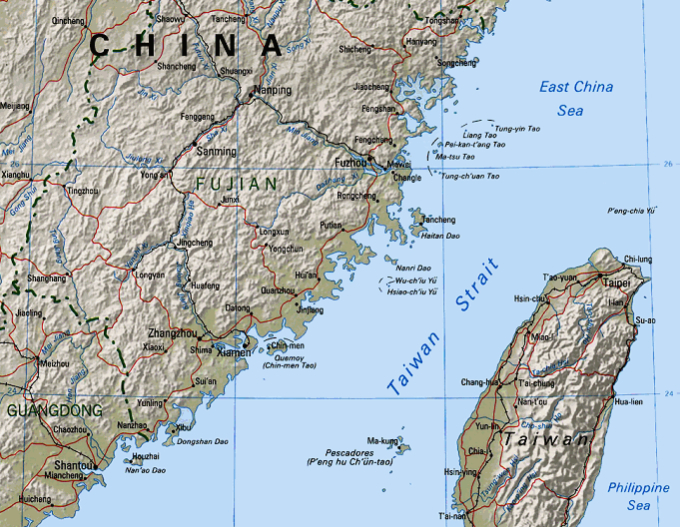Civilization
Wider China-Taiwan Concerns – the Other Side of the Coin

This opinion-editorial serves as a follow up – a “Part II,” if you will – of a piece here that addressed some of the reasons why a Chinese invasion of Taiwan this coming summer is not a sure thing. In that article, a few arguments were presented on why China may be hesitant to launch on capture of Taiwan – some of these issues concerned overarching economic and political considerations, geographic factors, planning and logistics challenges and warning signs. Contained here are several alternative points that rebut some of the arguments covered in that piece – all in the spirit of presenting comprehensive considerations for policymakers, planners, general readers, and those with a role in influencing national level decisions.
China does have designs on Taiwan
While the last piece suggested that a Chinese offensive of some sort would not likely occur within the next several months, the concerns regarding China’s designs for Taiwan cannot and should not be marginalized or discounted. It is entirely possible that, given the right conditions and circumstances, China will launch offensively to subsume Taiwan. If this possibility morphs into reality, the only questions are when and how.
A full-on history of the power and influence dynamics in the Asia-Pacific region are beyond the scope of this op-ed – but the simple fact of the matter is that we’re in a period now where China is the dominant power in the region (though, India is quickly asserting itself as counterweight to China, and Japan is once again realizing that it cannot remain solely reliant on the protective umbrella provided by her allies). It is within this context of understanding that will drive Chinese decisions, to include the Taiwan question.
Digging deeper, two key elements stand out – and they are linked: The first is China’s existential imperative to maintain its position as the dominant player in the western Pacific. The second is the political survival imperative of the Chinese Communist Party (CCP), and its need to maintain power, authority, and credibility domestically. If the decision is made to move on Taiwan, it will be largely for these reasons.
What an offensive on Taiwan would require
What an actual offensive against Taiwan might involve – in this writer’s opinion – would have to involve major combined operations that incorporate a several elements of national military power. As many informed commentators, regional authorities and practitioners have suggested, a naval blockade of Taiwan would be a key component to an offensive; it may in fact be the centerpiece effort of a squeeze-play on the island. Other siege-like efforts – such as cyber-attacks – would likely be incorporated in order to degrade infrastructure, tank Taiwan’s economy, and to sap the will and morale of the Taiwanese. Relentless incursions in Taiwan’s air defense zone by Chinese air forces that we see in the news on a regular basis may be trial runs for what will be needed to prosecute successful ground attack missions, airborne assaults, and to establish eventual air dominance over Taiwan.
My sense is that the Chinese would prefer to take control of Taiwan with the least amount of collateral damage and loss of life as possible. The CCP is nothing if not pragmatic – and their leaders are no doubt ruthless – but they likely desire control of a core national interest that is Taiwan that isn’t war torn, devastated, angry, and in need of being rebuilt. Once the die is cast, completing a military campaign often requires one to do things that weren’t in the original plan; new realities must be addressed as situations change and as the fog of war sets in and leaders are forced to make tough choices.
A greater resource requirement than appreciated
A few additional thoughts. My experience in supporting combat operations over the years (both in and out of uniform) is that it always takes more materiel, effort, and time to conduct and complete operations than initially anticipated. And for the Chinese, taking and holding an entire country like Taiwan, with its tough geography and limited areas of access would sap a lot of resources. This is why the primary aim of Taiwan’s defense is built around the idea of holding out long enough until allies arrive on scene in the event of an attack. And for China, while they have plenty of people and materiel, time will be of paramount importance in accomplishing their objectives. Speed to fight for Taiwan’s allies is absolutely vital should the balloon go up – and China knows this.
More broadly, an advance on Taiwan will likely occur if and when we are preoccupied, distracted and not in a position to immediately or adequately respond. Intervention, if significantly delayed, could be costly and dangerous and allow China to achieve major objectives, or dig in for the long haul; hesitation and vacillation in response only plays into their hands, hence the need for vigilance and deterrence up front.
American national will
I also remain concerned that part of a Chinese gamble on Taiwan depends on our national willpower, or unfortunate lack thereof – and that the CCP strategy is built on the premise of the U.S. sacrificing Taiwan in a “push-comes-to-shove” stand-up fight to avoid a larger conflict. Essentially, the Chinese would execute a snatch-and-grab, force the world to blink, and cement their gains through a protracted negotiations process that sees China keep what it wants, and everyone else get nothing in exchange for the promise of no more conflict. This is a page out of the extortionist bully playbook that dictators and terrorist groups have been running successfully for decades.
Of course, the long-term implications of either war, or a Taiwan now under the thumb of China, would be stunning on multiple fronts. An extended standoff would lead to a shutdown of production in key goods, such as computers, cell phones, and electronic devices all of which require high-end chips, including those used in U.S. military systems. At some point a decision will have to be made to destroy the production capacity or risk those chips falling into China’s hands, thereby ceding ground in things like quantum computing and next generation guidance systems. The post-invasion damage to just this supply-chain alone will ripple through the markets, the economy writ large, and impact every aspect of modern life.
Summary
In the best case, the status quo continues – China will continue to harass and needle Taiwan militarily, spread propaganda, subvert their domestic politics, and expand influence around the Indo-Pacific region (and beyond) in order to isolate Taiwan from the rest of the global community. China will continue with a soft push, progressively moving to annex or absorb their island neighbor (think Hong Kong). In the worst case, the threshold for an attack is reached, driven by a combination of internal CCP imperatives, exploitation of opportunity, and a perceived lack of global will to aid Taiwan. Only a determined strategy built on deterrence and reducing exposure to the economic consequences of attack, led by a united America and her allies will prevent the status quo from unraveling into a disastrous new paradigm.
This article was originally published by RealClearDefense and made available via RealClearWire.
Miguel Alejandro Laborde is a former NCO in the 160th SOAR (A), and a subject matter expert on defense aviation programs, capabilities, and platforms, with decades’ worth of experience in the aerospace industry supporting the joint force.
-

 Accountability2 days ago
Accountability2 days agoWaste of the Day: Principal Bought Lobster with School Funds
-

 Constitution2 days ago
Constitution2 days agoTrump, Canada, and the Constitutional Problem Beneath the Bridge
-

 Executive1 day ago
Executive1 day agoHow Relaxed COVID-Era Rules Fueled Minnesota’s Biggest Scam
-

 Civilization1 day ago
Civilization1 day agoThe End of Purple States and Competitive Districts
-

 Civilization5 days ago
Civilization5 days agoThe devil is in the details
-

 Civilization4 days ago
Civilization4 days agoThe Conundrum of President Donald J. Trump
-

 Executive4 days ago
Executive4 days agoTwo New Books Bash Covid Failures
-

 Executive14 hours ago
Executive14 hours agoWaste of the Day: Can You Hear Me Now?












